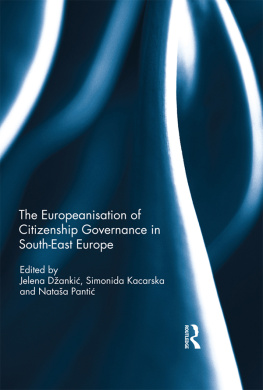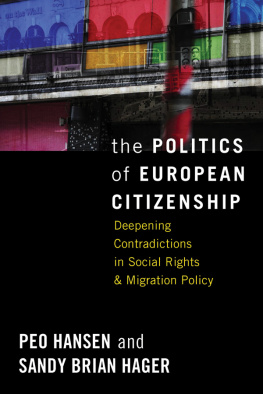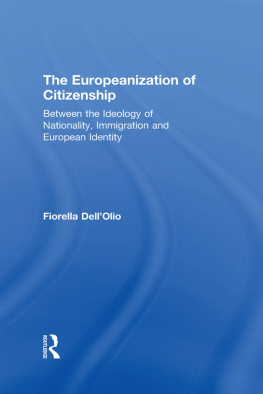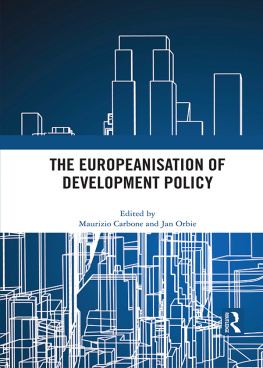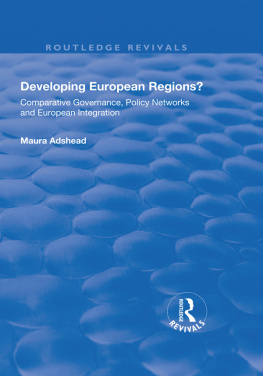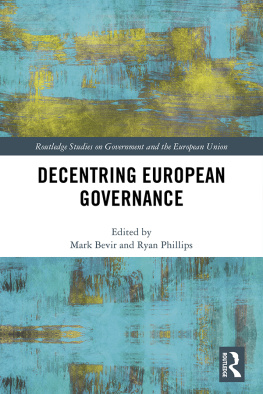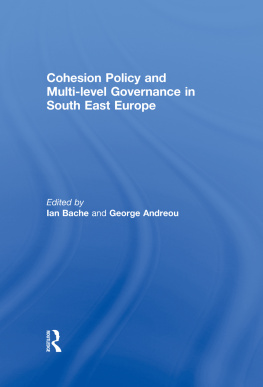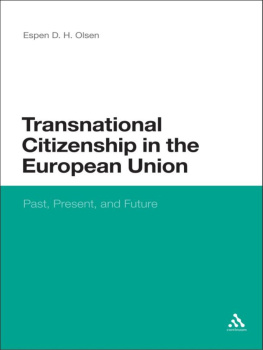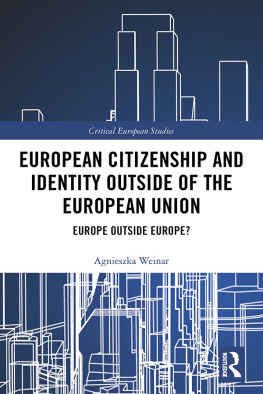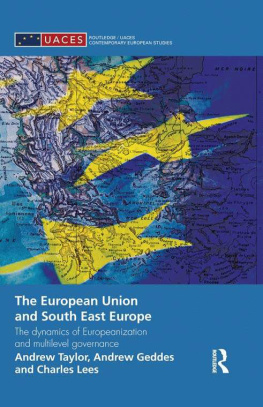The Europeanisation of Citizenship Governance in South-East Europe
This book looks at how Europeanisation affects the link between citizenship and governance in and across the new states of South-East Europe. Contributors unpack the intimate relationship between the European Union, national governments and citizens through a tripartite model that captures the uneven and diversified effects of Europeanisation on the governance of citizenship-related policy areas. Reflecting on the meaning of governance in different contexts, this book invites the readers to reconsider the terms and concepts that are commonly used for studying the consolidation of new states. By doing so, it directs attention to the transformative power of European integration not only on modes of governance, but also on practices and experiences of citizenship. Individual chapters are paired to examine three policy areas that are to a different degree affected by the requirements of European Union accession. Combining analysis of policy frameworks with assessment of their impact, the contributors highlight that the impact of Europeanisation can be located on a continuum stretching from strongest in matters regarding justice and home affairs, to moderate in general issues of social policy, to weakest in transforming citizenship through education policies. This book was originally published as a special issue of European Politics and Society.
Jelena Danki is a Marie Curie Fellow at the European University Institute. She holds a Ph.D. in International Studies from the University of Cambridge, UK.
Simonida Kacarska is Research Coordinator at the European Policy Institute in Skopje, Macedonia. She holds a Ph.D. in Politics and International Studies from the University of Leeds, UK.
Nataa Panti is a Chancellors Fellow at the School of Education of the University of Edinburgh, UK. She holds a Ph.D. in Education Sciences from Utrecht University, The Netherlands.
First published 2016
by Routledge
2 Park Square, Milton Park, Abingdon, Oxon, OX14 4RN, UK
and by Routledge
711 Third Avenue, New York, NY 10017, USA
Routledge is an imprint of the Taylor & Francis Group, an informa business
2016 Taylor & Francis
All rights reserved. No part of this book may be reprinted or reproduced or utilised in any form or by any electronic, mechanical, or other means, now known or hereafter invented, including photocopying and recording, or in any information storage or retrieval system, without permission in writing from the publishers.
Trademark notice: Product or corporate names may be trademarks or registered trademarks, and are used only for identification and explanation without intent to infringe.
British Library Cataloguing in Publication Data A catalogue record for this book is available from the British Library
ISBN 13: 978-1-138-18506-7
Typeset in Times
by diacriTech, Chennai
Publishers Note
The publisher accepts responsibility for any inconsistencies that may have arisen during the conversion of this book from journal articles to book chapters, namely the possible inclusion of journal terminology.
Disclaimer
Every effort has been made to contact copyright holders for their permission to reprint material in this book. The publishers would be grateful to hear from any copyright holder who is not here acknowledged and will undertake to rectify any errors or omissions in future editions of this book.
Contents
Jelena Danki, Simonida Kacarska, Nataa Panti and Jo Shaw
Jelena Danki
Simonida Kacarska
Marija Stambolieva
Paul Stubbs and Sinia Zrinak
Nataa Panti
Azra Hromadi
Andrew Geddes
The chapters in this book were originally published in the European Politics and Society, volume 16, issue 3 (September 2015). When citing this material, please use the original page numbering for each article, as follows:
Introduction: The Governance of Citizenship Practices in the Post-Yugoslav States: The Impact of Europeanisation
Jelena Danki, Simonida Kacarska, Nataa Panti and Jo Shaw
European Politics and Society, volume 16, issue 3 (September 2015) pp. 337346
The Unbearable Lightness of Europeanisation: Extradition Policies and the Erosion of Sovereignty in the Post-Yugoslav States
Jelena Danki
European Politics and Society, volume 16, issue 3 (September 2015) pp. 347362
Losing the Rights along the Way: The EUWestern Balkans Visa Liberalisation
Simonida Kacarska
European Politics and Society, volume 16, issue 3 (September 2015) pp. 363378
Welfare State Change and Social Citizenship in the Post-Yugoslav States
Marija Stambolieva
European Politics and Society, volume 16, issue 3 (September 2015) pp. 379394
Citizenship and Social Welfare in Croatia: Clientelism and the Limits of Europeanisation
Paul Stubbs and Sinia Zrinak
European Politics and Society, volume 16, issue 3 (September 2015) pp. 395410
Citizenship and Education in the Post-Yugoslav States
Nataa Panti
European Politics and Society, volume 16, issue 3 (September 2015) pp. 411428
Dissatisfied Citizens: Ethnonational Governance, Teachers Strike and Professional Solidarity in Mostar, BosniaHerzegovina
Azra Hromadi
European Politics and Society, volume 16, issue 3 (September 2015) pp. 429446
Conclusion: Citizenship and the Practice of Governance in South-East Europe
Andrew Geddes
European Politics and Society, volume 16, issue 3 (September 2015) pp. 447454
For any permission-related enquiries please visit:
http://www.tandfonline.com/page/help/permissions
JELENA DANKI*, SIMONIDA KACARSKA**, NATAA PANTI & JO SHAW
*Robert Schuman Centre for Advanced Studies, European University Institute, Italy; **European Policy Institute, Macedonia; Institute for Education, Teaching and Leadership (ETL), University of Edinburgh, UK; The Institute for Advanced Studies in the Humanities, University of Edinburgh, UK
ABSTRACT This Introduction explains the origins of the project of exploring citizenship and citizenship-related issues in the framework of Europeanisation in the new states in South East Europe. It defines the terminology used in the contributions and explains the conceptual underpinnings of the project and the structure of the edited collection. Finally, these introductory remarks also give an overview of the contributions to the special issue of Perspectives on European Politics and Societies entitled, The governance of citizenship practices in the post-Yugoslav states: The impact of Europeanisation.
Introduction
This special issue examines the governance of citizenship and citizenship-related issues in the context of complex and sometimes contested processes of Europeanisation in and across the new states of South East Europe. The basic premise for the research was the centrality of the construction and governance of its citizenship regime for each new state that emerged during the course of the progressive breakup of the Socialist Federal Republic of Yugoslavia (SFRY) from 1991 onwards. Each new state established the laws and policies necessary to determine not only who were the initial citizenry of the state, but also how citizenship was acquired (and sometimes lost) at birth, through residence (or non-residence), via descent, and through other recognised connections such as special qualities. However, the study of citizenship necessarily goes beyond these narrow boundaries, looking at other types of quasi statuses such as permanent residency as well as informal ideational and ideological aspects of citizenship policies. And while the starting point for such citizenship studies may be the status elements of membership, it quickly becomes evident that the enjoyment of citizenship can never fully be dissociated from its rights and identitarian elements.

